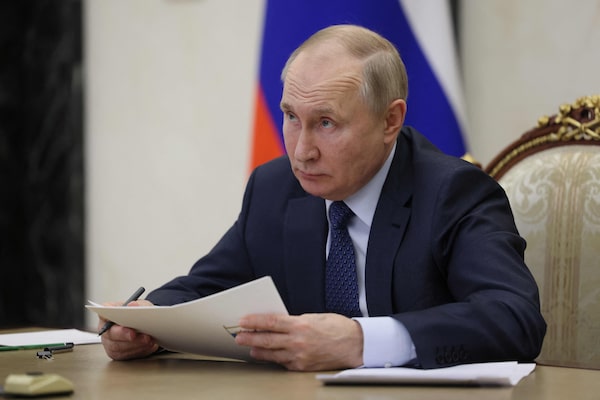
Russian President Vladimir Putin holds the annual meeting of the Presidential Council for Civil Society and Human Rights, via video conference, in Moscow on Dec. 7.MIKHAIL METZEL/AFP/Getty Images
Anna Arutunyan is a Russian-American writer and a global fellow at the Wilson Center. She is the author of The Putin Mystique: Inside Russia’s Power Cult and, more recently, Hybrid Warriors: Proxies, Freelancers, and Moscow’s Struggle for Ukraine.
As the new year approaches, Russian President Vladimir Putin – who uses his words and signals to create a formidable power vertical that, we are led to believe, controls all aspects of his government – doesn’t have much to say.
On Dec. 12, the Kremlin cancelled Mr. Putin’s yearly press conference for the first time in a decade, and his state of the nation address to parliament has been put off, with no sign of a new date. According to government officials, the course of Russia’s war in Ukraine – or the “special military operation,” as it is called at home – was a factor.
None of this should be surprising. Last month, Russian troops were forced to withdraw from the right bank of Ukraine’s Kherson region after declaring it Russian following a sham referendum. The manner in which this was done was also telling: one would imagine a dour President making the announcement in a special televised segment. But nothing of the sort happened: instead, Russia’s commander in Ukraine, General Sergei Surovikin, advised the Defence Minister, Sergei Shoigu, to withdraw, citing difficulties in logistics, and Mr. Shoigu agreed. Mr. Putin was nowhere to be seen.
Is the Russian President losing control? This would be an apt question to ask, but the better one is: How much control did Mr. Putin have to begin with?
General Surovikin was appointed commander of Russia’s “special military operation” in October, replacing Colonel-General Alexander Lapin following a barrage of criticism over mounting losses from Russia’s fiercest pro-war figures: Chechen leader Ramzan Kadyrov, whose forces are fighting in Ukraine, and businessman Yevgeny Prigozhin, who controls the Wagner private-military company.
Herein lies the problem: formally, General Surovikin controls the military operation in Ukraine. But in practice Mr. Kadyrov can veto any orders he gives the Chechen troops and Mr. Prigozhin, the businessman managing the Wagner mercenary group, can do the same for his hired soldiers. This creates a great deal of friction in co-ordinating the Russian offensive.
Nor is this situation new. The power and influence that figures like Mr. Kadyrov and Mr. Prigozhin enjoy today arose over the years owing to Mr. Putin’s penchant for over-delegation and reliance on non-state actors to do his dirty work. When Mr. Putin is unsure of how well any particular endeavour will go, it is best he not be seen calling the shots lest he have to answer for them. Today, just as in the past, Mr. Putin seems to be stepping back into the shadows so that other people can take the blame for the crisis unfolding on his watch.
Mr. Putin has let General Surovikin and Mr. Shoigu take full ownership of the military side of the war, while delegating the formidable task of economic mobilization to his Prime Minister, Mikhail Mishustin and, to a lesser extent, Moscow Mayor Sergei Sobyanin.
Purely from a strategic perspective, by stepping aside Mr. Putin may be strengthening Russia’s positions, leading to an entrenchment of the line of contact, with generals like Mr. Surovikin following the reality on the ground rather than being forced to conform to unrealistic and vague political goals set by the President. But from a political perspective, Mr. Putin’s absence is becoming conspicuous and feeding into a pattern of disappearing amid tough decisions, making him look weak. After hinting, through his press secretary, that he had not decided whether he would attend the G20 summit in Bali earlier in the month, officials confirmed on Nov. 9 – the same day the Kherson withdrawal was announced – that Mr. Putin would not be attending in person, and would send delegates instead.
That weakness will exacerbate the infighting between clans, invigorating hawkish players like Mr. Kadyrov and Mr. Prigozhin as they compete for a piece of the pie.
Yet it is wrong to assume that this portends an imminent shift in power or the removal of Mr. Putin himself. As noted, Mr. Putin has a tendency to recede into the shadows during crises, and he has done this before. Most notably, he delegated the handling of Russia’s response to COVID-19 to his regional officials. While the practice inevitably erodes his control and ability to run the country, it has also helped him survive politically. Whether it will continue doing so remains to be seen – there may come a point when deflecting blame undermines Mr. Putin’s ability to balance competing interests. The zugzwang he has gotten himself into – that chess predicament in which every move only worsens the outcome – can continue for a while, but not indefinitely.